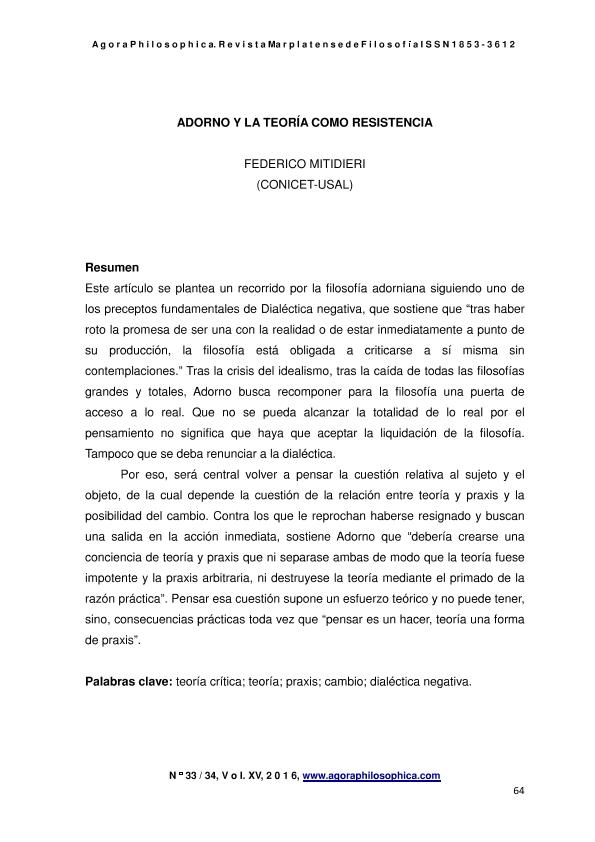Artículo
Este artículo se plantea un recorrido por la filosofía adorniana siguiendo uno de los preceptos fundamentales de Dialéctica negativa, que sostiene que “tras haber roto la promesa de ser una con la realidad o de estar inmediatamente a punto de su producción, la filosofía está obligada a criticarse a sí misma sin contemplaciones.” Tras la crisis del idealismo, tras la caída de todas las filosofías grandes y totales, Adorno busca recomponer para la filosofía una puerta de acceso a lo real. Que no se pueda alcanzar la totalidad de lo real por el pensamiento no significa que haya que aceptar la liquidación de la filosofía. Tampoco que se deba renunciar a la dialéctica. Por eso, será central volver a pensar la cuestión relativa al sujeto y el objeto, de la cual depende la cuestión de la relación entre teoría y praxis y la posibilidad del cambio. Contra los que le reprochan haberse resignado y buscan una salida en la acción inmediata, sostiene Adorno que “debería crearse una conciencia de teoría y praxis que ni separase ambas de modo que la teoría fuese impotente y la praxis arbitraria, ni destruyese la teoría mediante el primado de la razón práctica”. Pensar esa cuestión supone un esfuerzo teórico y no puede tener, sino, consecuencias prácticas toda vez que “pensar es un hacer, teoría una forma de praxis”. This paper presents a study of the Adornian philosophy following one of the main precepts of Negative Dialectics, which stands that “after having broken the promise of being one with reality or being immediately on the verge of it production, philosophy is compelled to criticize itself without contemplation.” After the crisis of idealism, after the fall of all great and total philosophies, Adorno seeks to recompose for philosophy a gateway to the real. That the totality of the real cannot be achieved by thought doesn’t mean that it is necessary to accept the liquidation of philosophy. Neither should dialectics be renounced. It will also be central to rethink the question of subject and object, upon which the question of the relation between theory and praxis depends, as well as the possibility of change. Against those who claimed that he have resigned and look for an exit in the immediate action, Adorno maintains that "a consciousness of theory and praxis should be created that would neither separate them so that theory would be impotent nor praxis arbitrary, nor destroy theory by the primacy of practical reason”. To think that question is a theoretical effort and cannot have but practical consequences whenever "to think is a doing, theory a form of praxis".
Adorno y la teoría como resistencia
Fecha de publicación:
12/2016
Editorial:
Asociación Argentina de Investigaciones Éticas
Revista:
Revista Agora
ISSN:
1853-3612
e-ISSN:
1515-3142
Idioma:
Español
Tipo de recurso:
Artículo publicado
Clasificación temática:
Resumen
Palabras clave:
TEORÍA CRÍTICA
,
PRAXIS
,
CAMBIO
,
DIALÉCTICA
Archivos asociados
Licencia
Identificadores
Colecciones
Articulos(SEDE CENTRAL)
Articulos de SEDE CENTRAL
Articulos de SEDE CENTRAL
Citación
Mitidieri, Carlos Federico; Adorno y la teoría como resistencia; Asociación Argentina de Investigaciones Éticas; Revista Agora; 15; 33-34; 12-2016; 64-73
Compartir




